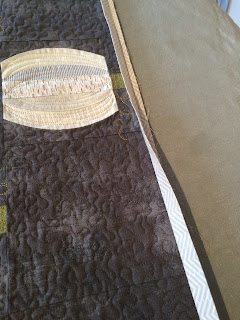I take a lot of pride in getting a job done right. I bet you do, too.
The final step in getting your precious quilt finished is a prize-winning binding.
Now, I don't know if my bindings are prize-winning because I have never entered them in a contest! But I do know that they turn out neat, tidy and consistent. So I'm going to tell you about a couple of very easy things that I think make a difference in the look of my binding when I'm done.
First off, I cut my bindings just 2" wide now. When I started quilting, the standard binding width was 2 1/2". Then it shifted over to 2 1/4". I think it's because of a few reasons, most notably the fact that the battings that I use now are not as "poofy" as they used to be. I use Quilter's Dream Cotton in the Select or DeLuxe weight. Either one is pretty compressed, if compared to some other brands. I used to use Hobbs Heirloom batting 80/20 mix (80% cotton/20% poly). That worked pretty good, but I found that there seemed to be a lot of variation in the thickness. Maybe that has changed, but when I started using Quilter's Dream because it was the brand we stocked at Bear Patch, I found my new favorite.
Another reason that I use a 2" strip is that I want the folded edge of the binding to just cover the binding seam when it is folded around and stitched to the back. I always use a walking foot when I sew on my binding, I've tried to do it without in an "emergency", and it just isn't right!
Also, I'm very careful to get a good 1/4" seam allowance when sewing the binding to the quilt. Sometimes, my seam allowance strays because the weight of the quilt puts too much drag on the portion that is going under the walking foot. So I keep a little table or cart handy to park to the left of my sewing table to support the bulk of the quilt as I'm sewing. Sometimes I even have to go back and correct a section that goes askew. Don't rush past that, just because you can see the finish line on the horizon!
So, after I've finished the machine sewing, I move to the ironing board. With the right side of the quilt facing up, I press the binding over in the direction that it will need to be folded for the hand stitching. In the picture below, you can see the bottom section of the binding is pressed over. It gives a nice crease and makes it easier to do the hand sewing.
In the corners, I just use the point of the iron to nudge the mitered corner out away from the quilt top.
Next, I sit down with a good movie and glass of wine to do the hand stitching. Or maybe I catch up on a few missed episodes of one of my favorite shows. Whatever floats your boat!
Finally, after I've taken the last stitch, I go back to the ironing board and press the binding from both the right side and wrong side of the quilt. It now lays nice and flat and smooth.
Voila! Try it for yourself! Happy binding!




3 comments:
What a great binding tutorial! I was surprised when I first found out you use a 2" binding strip, but it makes total sense. I don't like having too much hanging over on the back of the quilt. What about your corners? Do you sew the tiny mitered corners? Some people swear by that. Thanks for a great post.
Do you mean sewing the mitered corner by hand along with the rest of the binding? If so, no, I don't do that and as far as I know I've never seen a problem with that. What about you?
Someone who had been a quilt judge said to sew the little corners. That's all I know.
Post a Comment